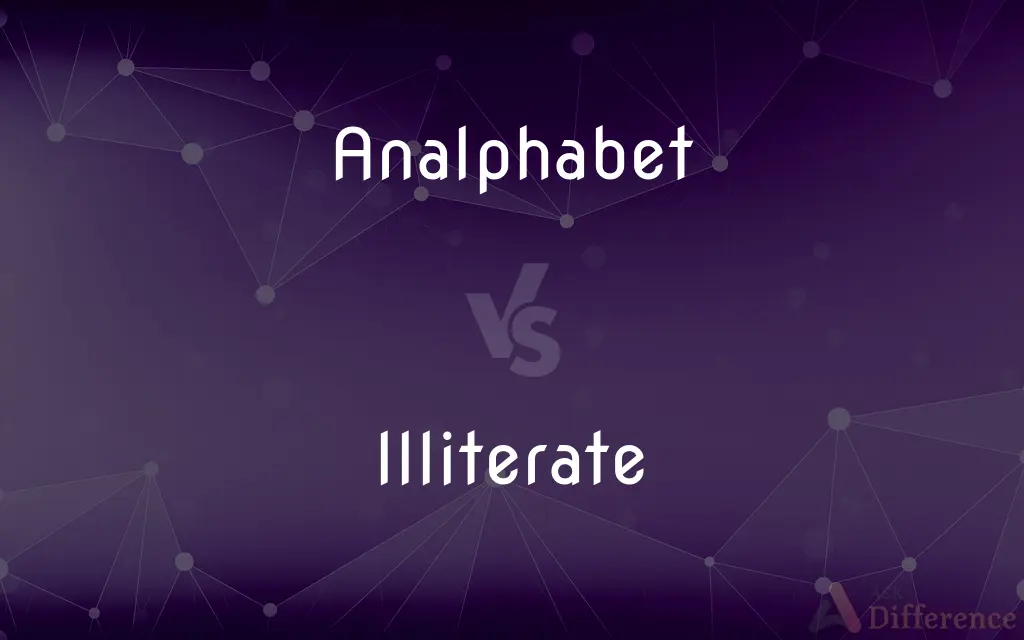Analphabet vs. Illiterate — What's the Difference?
By Maham Liaqat & Fiza Rafique — Updated on April 4, 2024
An analphabet is someone who cannot read or write because they have never been taught, focusing on the lack of education. Illiterate generally refers to a person's inability to read or write in any language, often despite some educational exposure.

Difference Between Analphabet and Illiterate
Table of Contents
ADVERTISEMENT
Key Differences
An analphabet specifically refers to an individual who has not had the opportunity to learn reading and writing skills due to lack of access to education. This term underscores the absence of basic literacy education, pointing to systemic or situational barriers that prevent individuals from acquiring these fundamental skills. On the other hand, an illiterate person might have had some form of education but remains unable to read or write effectively. Illiteracy can result from insufficient education, learning disabilities, or other factors that impede the acquisition of literacy skills despite educational opportunities.
The concept of an analphabet is often applied in contexts where educational systems are inaccessible, unavailable, or inadequate, highlighting the direct link between educational opportunity and literacy. Illiteracy, while also concerned with the inability to read or write, encompasses a broader range of scenarios, including those where education is available but ineffective, or where personal circumstances limit one's ability to become literate.
In discussions about global education and development, the distinction between analphabetism and illiteracy is crucial for understanding the different challenges faced by populations around the world. Efforts to combat analphabetism might focus on increasing access to education, while strategies to reduce illiteracy could address improving educational quality, tailoring education to diverse learning needs, or adult education programs.
The term "analphabet" highlights a systemic issue, suggesting solutions that involve infrastructural development, policy changes, and increased funding for education. Illiteracy, by comparison, suggests a need for intervention at both the systemic and individual levels, including educational reform, specialized learning programs, and community-based literacy initiatives.
In social and economic contexts, being an analphabet often signifies a barrier to entry into the formal economy, as basic literacy is a prerequisite for most employment opportunities. Illiteracy, while it may not always stem from a complete lack of education, similarly limits individuals' abilities to engage fully in society, access information, and advocate for themselves and their communities.
ADVERTISEMENT
Comparison Chart
Definition
Someone who cannot read or write due to no education
A person unable to read or write, often despite some education
Cause
Lack of access to education
Insufficient education, learning disabilities, etc.
Context of Use
Highlighting lack of educational access
Broader scenarios including inadequate education
Focus
Absence of literacy education
Inability to read or write effectively
Suggested Solutions
Increase access to education
Improve educational quality, specialized programs
Compare with Definitions
Analphabet
A person who has never been taught to read or write.
Many community programs aim to help analphabets learn basic literacy.
Illiterate
Lacking the ability to read or write effectively, regardless of educational exposure.
Adult literacy classes cater to illiterate individuals seeking to improve their skills.
Analphabet
Refers to the condition of not having received any formal education.
In remote areas, a significant number of people are analphabets due to lack of schools.
Illiterate
Refers to a person's inability to read or write in any language.
Illiterate adults may rely on others for tasks requiring reading or writing.
Analphabet
Someone who lacks basic literacy skills due to no educational opportunities.
NGOs focus on reducing the number of analphabets in underdeveloped regions.
Illiterate
Someone who can neither read nor write at a functional level.
Illiteracy affects a person's job prospects and social integration.
Analphabet
The state of being uneducated in reading and writing.
The government's initiative aims to lower the analphabet rate by opening new schools.
Illiterate
The condition of having limited literacy skills despite some education.
Even with schooling, many remain functionally illiterate.
Analphabet
Individuals who are unable to engage in reading or writing activities.
Analphabets often face challenges in accessing information and services.
Illiterate
Inability to read or write, often hindering personal and economic development.
Programs targeting illiterate populations aim to enhance literacy and quality of life.
Analphabet
A person who does not know the letters of the alphabet; a partly or wholly illiterate person.
Illiterate
Unable to read and write.
Analphabet
Ignorant of the letters of the alphabet; partly or wholly illiterate.
Illiterate
Having little or no formal education.
Analphabet
An illiterate person who does not know the alphabet
Illiterate
Marked by inferiority to an expected standard of familiarity with language and literature
An illiterate magazine.
Illiterate
Violating prescribed standards of speech or writing
A paragraph with several illiterate expressions.
Illiterate
Ignorant of the fundamentals of a given art or branch of knowledge
Musically illiterate. See Usage Note at literate.
Illiterate
A person who is illiterate.
Illiterate
(used with a pl. verb) People who are illiterate, considered as a group.
Illiterate
Unable to read and write.
Illiterate
Having less than an expected standard of familiarity with language and literature, or having little formal education.
Illiterate
Not conforming to prescribed standards of speech or writing.
Illiterate
Ignorant in a specified way or about a specified subject.
Economically illiterate, emotionally illiterate
Illiterate
An illiterate person, one either not able to read and write or not knowing how.
Illiterate
A person ignorant about a given subject.
The government is run by business illiterates.
Illiterate
Unable to read or write; ignorant of letters or books; unlettered; uninstructed; uneducated; as, an illiterate man, or people.
Illiterate
A person unable to read
Illiterate
Not able to read or write
Illiterate
Ignorant of the fundamentals of a given art or branch of knowledge;
Ignorant of quantum mechanics
Musically illiterate
Common Curiosities
Are there different levels of illiteracy?
Yes, from functional illiteracy, where individuals have basic literacy but cannot apply it effectively, to complete illiteracy.
What causes someone to be an analphabet?
Primarily lack of access to education due to geographical, economic, or social barriers.
How is analphabetism measured?
Often through surveys and studies that assess access to and quality of education in a given area.
Is illiteracy the same as being uneducated?
Not necessarily; an illiterate person may have received some education but lacks proficiency in reading and writing.
What economic barriers do analphabets face?
Limited employment opportunities, lower wages, and a higher likelihood of poverty.
Who is at risk of becoming an analphabet?
Individuals in regions without schools or where conflict, poverty, or cultural norms restrict educational access.
Can analphabetism be eliminated?
With increased educational access, infrastructure, and policy support, analphabetism can be significantly reduced.
What impact does being illiterate have on an individual?
It limits job opportunities, access to information, and the ability to fully participate in society and make informed decisions.
How does analphabetism affect a country's development?
It hampers economic growth, reduces workforce skills, and limits individuals' contributions to society.
How does illiteracy affect health?
It can lead to poorer health outcomes due to difficulties in accessing health information and making informed health decisions.
What role do NGOs play in combating analphabetism and illiteracy?
NGOs often provide critical support through literacy programs, educational resources, and advocacy for policy changes.
Is it common for illiterate individuals to have gone to school?
Yes, some individuals may attend school but remain illiterate due to poor quality education or learning difficulties.
Share Your Discovery

Previous Comparison
Alluvium vs. Breccia
Next Comparison
Troubadour vs. BardAuthor Spotlight
Written by
Maham LiaqatCo-written by
Fiza RafiqueFiza Rafique is a skilled content writer at AskDifference.com, where she meticulously refines and enhances written pieces. Drawing from her vast editorial expertise, Fiza ensures clarity, accuracy, and precision in every article. Passionate about language, she continually seeks to elevate the quality of content for readers worldwide.














































